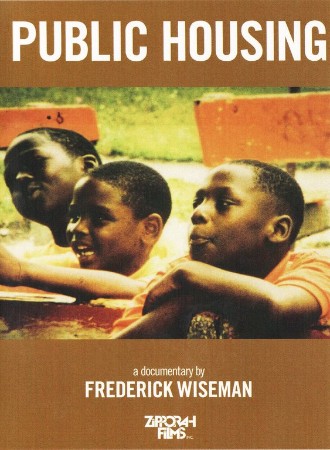
Public Housing 1997
Distributed by Zipporah Films, Inc., One Richdale Ave. #4, Cambridge, MA 02140; (617) 576-3603
Produced by Frederick Wiseman
Directed by Frederick Wiseman
VHS, color, 195 min.
Adult
Sociology, Political Science, Social Work
Date Entered: 11/09/2018
Reviewed by Scott Smith, Lorette Wilmot Library, Nazareth College, Rochester, NYWhat more really needs to be said in support of the purchase of a documentary from Frederick Wiseman, the master of direct-cinema and creator of the classic The Titicut Follies (1967), other than that it is available? This powerful work examines daily life in the Ida B. Wells public housing complex in Chicago, chronicling the activities of its residents and various other people associated with it, including community activists, social workers, and Chicago Housing Authority representatives. Instead of depicting heroes and villains, the documentary presents people attempting to cope with the grinding cycle of poverty, whether as individuals who are themselves impoverished or as those whose role is to assist the residents. Police officers are portrayed as both bullying and as genuinely concerned, as cynics and as social workers. Who is more deluded, the HUD representative who blithely tells residents how they will empower themselves and get loans of tens of thousands of dollars to start their own businesses or the various residents cut down by drug addiction who assert that they have things under control. Inside of an apartment an obviously uncomprehending aged gentleman is evicted while outside children play basketball and gardens are tended. While one child is tended to lovingly, another's face is slapped for some infringement. In other words, this is an unflinching presentation of real life. Although race and the effects of racism pervade this work, nothing is clearly black or white, all is tinted in shades of gray.
Public Housing is presented with no musical accompaniment, no narration, no interviews, and, with the exception of the title shot and the closing credits, no titling or captions. It is up to the viewer to come to conclusions about what has been presented and why. Public Housing is appropriate for junior high through adult levels (there are a very few instances of offensive language) and would be an excellent tool to generate class discussion. Although the sheer length of the program might tempt an instructor to pick and choose segments to show, much of the power of the work would be lost without the juxtaposition of the various scenes; it might be best to commit enough class time to show the entire documentary, perhaps broken up by taking discussion breaks at several different points during the program. The technical quality of the videotape is outstanding and it should be considered for all general collections and for use in support of programs in sociology, political science, public administration, social work, and urban studies. Highly recommended.